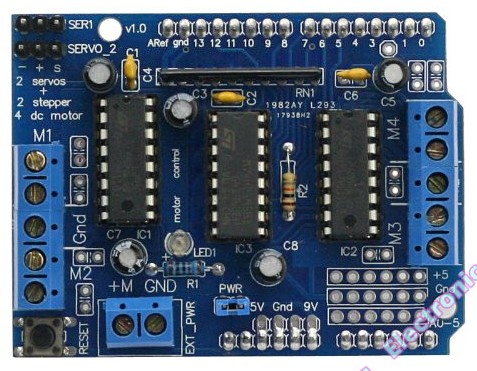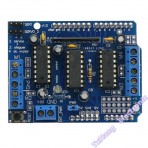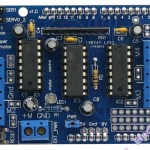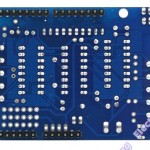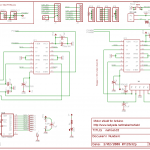L293D is a monolithic integrated, high voltage, high current, 4-channel driver,you can use DC motors and power supplies of up to 36 Volts, the L293D chip is alsoknown as a type of H-Bridge,which is typically an electrical circuit that enables a voltage to be applied across a load in either direction to an output, e.g. motor.
- 2 interface for 5V Servo connected to the Arduino's high-resolution dedicated timer - no jitter.
- Can drive 4 DC motors or 2 stepper motors or 2 Servo.
- Up to 4 bi-directional DC motors with individual 8-bit speed selection.
- Up to 2 stepper motors (unipolar or bipolar) with single coil, double coil or interleaved stepping.
- 4 H-Bridges: per bridge provides 0.6A (1.2A peak current) with thermal protection, can run motors on 4.5V to 36V DC.
- Pull down resistors keep motors disabled during power-up.
- 2 external terminal power interface, for seperate logic/motor supplies.
What pins are not used on the motor shield?
All 6 analog input pins are available. They can also be used as digital pins (pins #14 thru 19) Digital pin 2, and 13 are not used. The following pins are in use only if the DC/Stepper noted is in use:- Digital pin 11: DC Motor #1 / Stepper #1 (activation/speed control)
- Digital pin 3: DC Motor #2 / Stepper #1 (activation/speed control)
- Digital pin 5: DC Motor #3 / Stepper #2 (activation/speed control)
- Digital pin 6: DC Motor #4 / Stepper #2 (activation/speed control)
- Digital pin 4, 7, 8 and 12 are used to drive the DC/Stepper motors via the 74HC595 serial-to-parallel latch
- Digitals pin 9: Servo #1 control
- Digital pin 10: Servo #2 control

